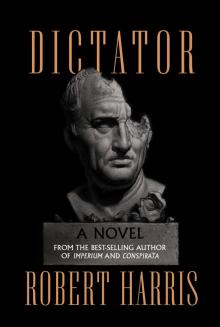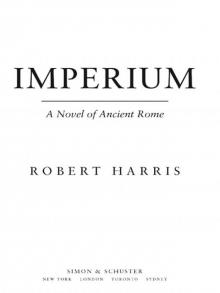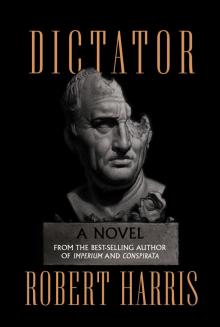- Home
- Robert Harris
Dictator: Page 2
Dictator: Read online
Page 2
It took us two weeks of arduous travel to cross the mountains, often in heavy rain and mostly along bad roads. Every mile seemed fraught with the hazard of ambush, although the primitive little towns we passed through were welcoming enough. At night we slept in smoky, freezing inns and dined on hard bread and fatty meat made scarcely more palatable by sour wine. Cicero’s mood veered between fury and despair. He saw clearly now that he had made a terrible mistake by leaving Rome. It had been madness for him to quit the city and leave Clodius free to spread the calumny that he had put citizens to death ‘unheard and uncondemned’ when in fact each of the five Catiline conspirators had been allowed to speak in his own defence and their execution had been sanctioned by the entire Senate. But his flight was tantamount to an admission of guilt. He should have obeyed his instinct and turned back when he heard Caesar’s departing trumpets and first began to realise his error. He wept at the disaster his folly and timidity had brought upon his wife and children.
And when he had finished lashing himself, he turned his scourge on Hortensius ‘and the rest of the aristocratic gang’, who had never forgiven him for rising from his humble origins to the consulship and saving the republic: they had deliberately urged him to flee in order to ruin him. He should have heeded the example of Socrates, who said that death was preferable to exile. Yes, he should have killed himself! He snatched up a knife from the dining table. He would kill himself! I said nothing. I didn’t take the threat seriously. He couldn’t stand the sight of others’ blood, let alone his own. All his life he had tried to avoid military expeditions, the games, public executions, funerals – anything that might remind him of mortality. If pain frightened him, death terrified him – which, although I would never have been impertinent enough to point it out, was the principal reason we had fled Rome in the first place.
When finally we came within sight of the fortified walls of Brundisium, he decided not to venture inside. The port was so large and busy, so full of strangers, and so likely to be his destination, he was convinced it was the obvious spot for his assassination. Instead we sought sanctuary a little way up the coast, in the residence of his old friend Marcus Laenius Flaccus. That night we slept in decent beds for the first time in three weeks, and the next morning we went down to the beach. The waves were much rougher than on the Sicilian side. A strong wind was hurling the Adriatic relentlessly against the rocks and shingle. Cicero loathed sea voyages at the best of times; this one promised to be especially treacherous. Yet it was our only means of escape. One hundred and twenty miles beyond the horizon lay the shore of Illyricum.
Flaccus, noticing his expression, said, ‘Fortify your spirits, Cicero – perhaps the bill won’t pass, or one of the other tribunes will veto it. There must be someone left in Rome willing to stand up for you – Pompey, surely?’
But Cicero, his gaze still fixed out to sea, made no reply, and a few days later we heard that the bill had indeed become law and that Flaccus was therefore guilty of a capital offence simply by having a convicted exile on his premises. Even so he tried to persuade us to stay. He insisted that Clodius didn’t frighten him. But Cicero wouldn’t hear of it: ‘Your loyalty moves me, old friend, but that monster will have dispatched a team of his hired fighters to hunt me down the moment his law passed. There is no time to lose.’
I had found a merchant ship in the harbour at Brundisium whose hard-pressed master was willing to risk a winter voyage across the Adriatic in return for a huge fee, and the next morning at first light, when no one was around, we went on board. She was a sturdy, broad-beamed vessel, with a crew of about twenty, used to ply the trade route between Italy and Dyrrachium. I was no judge of these things, but she looked safe enough to me. The master estimated the crossing would require a day and a half – but we needed to leave quickly, he said, and take advantage of the favourable wind. So while the sailors made her ready and Flaccus waited on the quayside, Cicero quickly dictated a final message to his wife and children: It has been a fine life, a great career – the good in me, nothing bad, has brought me down. My dear Terentia, loyalest and best of wives, my darling daughter Tullia, and little Marcus, our one remaining hope – goodbye! I copied it out and passed it up to Flaccus. He raised his hand in farewell. Then the sail was unfurled, the cables cast off, the oarsmen pushed us away from the harbour wall, and we set off into the pale grey light.
At first we made good speed. Cicero stood high above the deck on the steersmen’s platform, leaning on the stern rail, watching the great lighthouse of Brundisium recede behind us. Apart from his visits to Sicily, it was the first time he had left Italy since his youth, when he went to Rhodes to learn oratory from Molon. Of all the men I ever knew, Cicero was the least equipped by temperament for exile. To thrive he needed the appurtenances of civilised society – friends, news, gossip, conversation, politics, dinners, plays, baths, books, fine buildings; to watch all these dwindle away must have been an agony for him.
Nevertheless, in little more than an hour they had gone, swallowed up in the void. The wind drove us forwards strongly, and as we cut through the whitecaps I thought of Homer’s ‘dark blue wave/foaming at the bow’. But then around the middle of the morning the ship seemed gradually to lose propulsion. The great brown sail became slack-bellied and the two steersmen standing at their levers on either side of us began exchanging anxious looks. Soon dense black clouds started to mass on the horizon, and within an hour they had closed over our heads like a trapdoor. The light became shadowy; the temperature dropped. The wind got up again, but this time the gusts were in our faces, driving the cold spray off the surface of the waves. Hailstones raked the heaving deck.
Cicero shuddered, leaned forwards and vomited. His face was as grey as a corpse. I put my arm around his shoulders and indicated that we should descend to the lower deck and seek shelter in the cabin. We were halfway down the ladder when a flash of lightning split the gloom, followed instantly by a deafening, sickening crack, like a bone snapping or a tree splintering, and I was sure we must have lost the mast, for suddenly we seemed to be tumbling over and over while all around us great glistening black mountains of jet towered and toppled in the lightning flashes. The shriek of the wind made it impossible to speak or hear. In the end I simply pushed Cicero into the cabin, fell in after him and closed the door.
We tried to stand, but the ship was listing. The deck was ankle-deep in water. Our feet slid from under us. The floor tilted first one way and then the other. We clutched at the walls as we were pitched back and forth in the darkness amid loose tools and jars of wine and sacks of barley, like dumb beasts in a crate on our way to slaughter. Eventually we wedged ourselves in a corner and lay there soaked and shivering as the boat shook and plunged. I was sure we were doomed and closed my eyes and prayed to Neptune and all the gods for deliverance.
A long time passed. How long I cannot say – certainly it was the remainder of that day, and the whole of the night, and part of the day that followed. Cicero seemed quite unconscious; on several occasions I had to touch his cold cheek to reassure myself he was still alive. Each time his eyes opened briefly and then closed again. Afterwards he said he had fully resigned himself to drowning but such was the misery of his seasickness he felt no fear: rather he saw how Nature in her mercy spares those in extremis from the terrors of oblivion and makes death seem a welcome release. Almost the greatest surprise of his life, he said, was when he awoke on the second day and realised the storm was over and his existence would continue after all: ‘Unfortunately my situation is so wretched, I almost regret it.’
Once we were sure the storm had blown itself out, we went back on deck. The sailors were just at that moment tipping over the side the corpse of some poor wretch whose head had been smashed by a swinging boom. The Adriatic was oily-smooth and still, of the same grey shade as the sky, and the body slid into it with scarcely a splash. There was a smell on the cold wind I didn’t recognise, of something rotten and decaying. About a mile away I noticed a wall of sheer black
rock rising above the surf. I assumed we had been blown back home again and that it must be the coast of Italy. But the captain laughed at my ignorance and said it was Illyricum, and that those were the famous cliffs that guard the approaches to the ancient city of Dyrrachium.
Cicero had at first intended to make for Epirus, the mountainous country to the south, where Atticus owned a great estate that included a fortified village. It was a most desolate region, having never recovered from the terrible fate decreed it by the Senate a century earlier, when, as a punishment for siding against Rome, all seventy of its towns had been razed to the ground simultaneously and its entire population of one hundred and fifty thousand sold into slavery. Nevertheless, Cicero claimed he wouldn’t have minded the solitude of such a haunted spot. But just before we left Italy Atticus had warned him – ‘with regret’ – that he could only stay for a month lest word of his presence become known: if it did, under clause two of Clodius’s bill, Atticus himself would be liable to the death penalty for harbouring the exile.
Even as we stepped ashore at Dyrrachium Cicero remained in two minds about which direction to take – south to Epirus, temporary refuge though it would be, or east to Macedonia, where the governor, Apuleius Saturninus, was an old friend of his, and from Macedonia on to Greece and Athens. In the event, the decision was made for him. A messenger was waiting on the quayside – a young man, very anxious. Glancing around to make sure he was not observed, he drew us quickly into a deserted warehouse and produced a letter. It was from Saturninus, the governor. I do not have it in my archives because Cicero seized it and tore it to pieces the moment I had read it out loud to him. But I can still remember the gist of what it said: that ‘with regret’ (that phrase again!), despite their years of friendship, Saturninus would not be able to receive Cicero in his household as it would be ‘incompatible with the dignity of a Roman governor to offer succour to a convicted exile’.
Hungry, damp and exhausted from our crossing, having hurled the fragments of the letter to the ground, Cicero sank on to a bale of cloth with his head in his hands. That was when the messenger said nervously, ‘Your Excellency, there is another letter …’
It was from one of the governor’s junior magistrates, the quaestor Gnaeus Plancius. His family were old neighbours of the Ciceros from their ancestral lands around Arpinum. Plancius said that he was writing secretly and sending his letter via the same courier, who was to be trusted; that he disagreed with his superior’s decision; that it would be an honour for him to take the Father of the Nation under his protection; that secrecy was vital; that he had already set out on the road to meet him at the Macedonian border; and that in the meantime he had arranged for a carriage to transport Cicero out of Dyrrachium ‘immediately, in the interests of your personal safety; I plead with you not to delay by so much as an hour; I shall explain more when I see you’.
‘Do you trust him?’ I asked.
Cicero stared at the floor and in a low voice replied, ‘No. But what choice do I have?’
With the messenger’s help I arranged for our luggage to be transferred from the boat to the quaestor’s carriage – a gloomy contraption, little better than a cell on wheels, without suspension and with metal grilles nailed over the windows so that its fugitive occupant could look out but no one could see him. We clattered up from the harbour into the city and joined the traffic on the Via Egnatia, the great highway that runs all the way to Byzantium. It started to sleet. There had been an earthquake a few days earlier and the place was wretched in the downpour, with corpses of the native tribespeople unburied by the roadside and here and there little groups of survivors sheltering in makeshift tents among the ruins, huddled over smoking fires. It was this odour of destruction and despair that I had smelt out at sea.
We travelled across the plain towards the snow-covered mountains and spent the night in a small village hemmed in by the encroaching peaks. The inn was squalid, with goats and chickens in the downstairs rooms. Cicero ate little and said nothing. In this strange and barren land, with its savage-looking people, he had at last fallen into the full depths of despair, and it was only with difficulty that I roused him from his bed the next morning and persuaded him to continue our journey.
For two days the road climbed into the mountains, until we came to the edge of a wide lake, fringed with ice. On the far side was a town, Lychnidos, that marked the border with Macedonia, and it was here, in its forum, that Plancius awaited us. He was in his early thirties, strongly built, wearing military uniform, with half a dozen legionaries at his back, and there was a moment when they all began to stride towards us that I experienced a rush of panic and feared we had blundered into a trap. But the warmth with which Plancius embraced Cicero, and the tears in his eyes, convinced me immediately that he was genuine.
He could not disguise his shock at Cicero’s appearance. ‘You need to recover your strength,’ he said, ‘but unfortunately, we must leave here straight away.’ And then he told us what he had not dared put into his letter: that he had received reliable intelligence that three of the traitors Cicero had sent into exile for their parts in Catilina’s conspiracy – Autronius Paetas, Cassius Longinus and Marcus Laeca – were all out looking for him, and had sworn to kill him.
Cicero said, ‘Then there is nowhere in the world where I am safe. How are we to live?’
‘Under my protection, as I said. In fact come back with me to Thessalonica, and stay under my very roof. I was military tribune until last year and I’m still on active service, so there’ll be soldiers to guard you as long as you stay within the frontiers of Macedonia. My house is no palace, but it’s secure and it’s yours for as long as you need it.’
Cicero stared at him. Apart from the hospitality of Flaccus, it was the first real offer of help he had received for weeks – for months, in fact – and that it should have come from a young man he barely knew, when old allies such as Pompey had turned their backs on him, moved him deeply. He tried to speak, but the words choked in his throat and he had to look away.
The Via Egnatia runs for one hundred and fifty miles across the mountains of Macedonia before descending to the plain of Amphaxis, where it enters the port of Thessalonica, and this was where our journey ended, two months after leaving Rome, in a secluded villa off a busy thoroughfare in the northern part of the town.
Five years earlier, Cicero had been the undisputed ruler of Rome, second only to Pompey the Great in the affections of the people. Now he had lost everything – reputation, position, family, possessions, country; even at times the balance of his mind. For reasons of security he was confined to the villa during the hours of daylight. His presence was kept secret. A guard was posted at the entrance. Plancius told his staff that his anonymous guest was an old friend suffering from acute grief and melancholia. Like all the best lies it had the merit of being partly true. Cicero barely ate, or spoke, or left his room; sometimes his fits of weeping could be heard from one end of the house to the other. He would not receive visitors, not even his brother Quintus, who was passing nearby on his way back to Rome after completing his term as governor of Asia: You would not have seen your brother the man you knew, he pleaded in mitigation, not a trace or semblance of him but only the likeness of a breathing corpse. I tried my best to console him, without success, for how could I, a slave, understand his sense of loss, having never possessed anything worth losing in the first place? Looking back, I can see that my attempts to offer solace through philosophy must only have added to his aggravation. Indeed on one occasion, when I tried to advance the Stoic argument that possessions and rank are unnecessary, given that virtue alone is sufficient for happiness, he threw a stool at my head.
We had arrived in Thessalonica at the beginning of spring, and I took it upon myself to send letters to Cicero’s friends and family letting them know, in confidence, where he was hiding, and asking them to write in response using Plancius as a poste restante. It took three weeks for these messages to reach Rome, and a further three weeks b
efore we started to receive replies, and the news they brought was anything but encouraging. Terentia described how the charred walls of the family house on the Palatine hill had been demolished so that Clodius’s shrine to Liberty – the irony! – could be erected on the site. The villa at Formiae had been pillaged, the country estate in Tusculum also invaded, and even some of the trees in the garden carted off by the neighbours. Homeless, at first she had taken refuge with her sister in the House of the Vestal Virgins.
But that impious wretch Clodius, in defiance of all the sacred laws, broke into the temple, and dragged me to the Basilica Porcia, where in front of the mob he had the impertinence to question me about my own property! Of course I refused to answer. He then demanded that I hand over our little son as a hostage to my good behaviour. In answer I pointed to the painting that shows Valerius defeating the Carthaginians and reminded him that my ancestors fought in that very battle and that as my family had never feared Hannibal, we most certainly would not be intimidated by him.
It was the plight of his son that most upset Cicero: ‘The first duty of any man is to protect his children, and I am helpless to fulfil it.’ Marcus and Terentia were now sheltering in the home of Cicero’s brother, while his adored daughter, Tullia, was sharing a roof with her in-laws. But although Tullia, like her mother, tried to make light of her troubles, it was easy enough to read between the lines and recognise the truth: that she was nursing her sick husband, the gentle Frugi – whose health, never robust, seemed to have collapsed under the strain. Ah, my beloved, my heart’s longing! Cicero wrote to his wife. To think that you, dearest Terentia, once everybody’s refuge in trouble, should now be so tormented! You are before my eyes night and day. Goodbye, my absent loves, goodbye.
The political outlook was equally bleak. Clodius and his supporters were continuing their occcupation of the Temple of Castor in the southern corner of the Forum. Using this fortress as their headquarters, they could intimidate the voting assemblies and pass or block whatever bills they chose. One new law we heard about, for example, demanded the annexation of Cyprus and the taxation of its wealth, ‘for the good of the Roman people’ – that is, to pay for the free dole of corn Clodius had instituted for every citizen – and charged Marcus Porcius Cato with accomplishing this piece of theft. Needless to say, it passed, for what group of voters ever refused to levy a tax on someone else, especially if it benefited themselves? At first Cato refused to go. But Clodius threatened him with prosecution if he disobeyed the law. As Cato held the constitution to be sacred above all things, he felt he had no choice but to comply. He sailed off for Cyprus, along with his young nephew, Marcus Junius Brutus, and with his departure Cicero lost his most vocal supporter in Rome.

 An Officer and a Spy
An Officer and a Spy Dictator
Dictator Imperium:
Imperium: Enigma
Enigma Fatherland
Fatherland Dictator:
Dictator: Lustrum
Lustrum Archangel
Archangel Conclave
Conclave The Fear Index
The Fear Index The Second Sleep
The Second Sleep V2
V2 Lustrum c-2
Lustrum c-2 Imperium
Imperium The Dictator
The Dictator Selling Hitler
Selling Hitler Archangel (Mass Market Paperback)
Archangel (Mass Market Paperback)